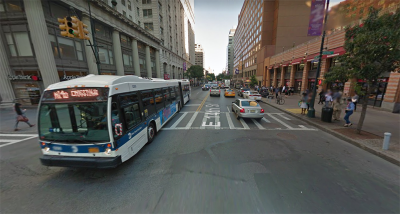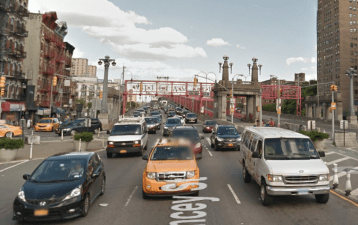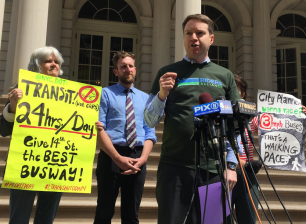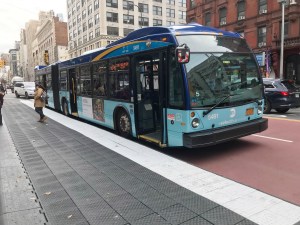MTA Says Buses Are The Best Bet on 14th St. During the L Slowdown — But Busway Remains In Flux
DOT began installing the busway before Governor Cuomo canceled the L shutdown — now its future is uncertain.
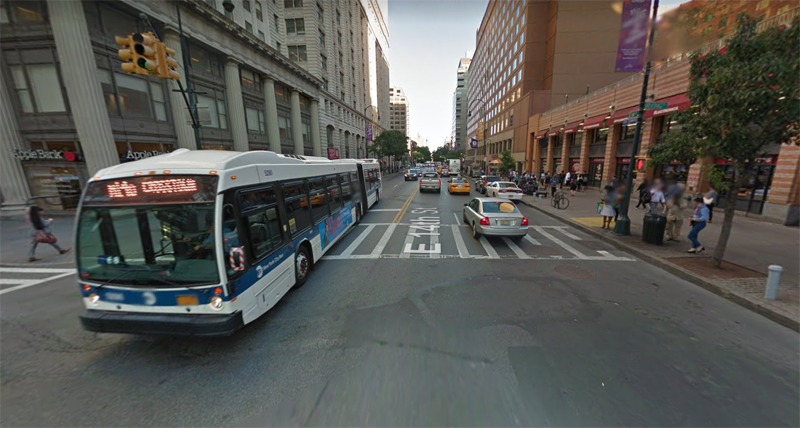
The MTA seems to be goading Mayor de Blasio into action on 14th Street.
The city has yet to announce whether it will keep the almost-finished dedicated busway it built on 14th Street ahead of the L-train repairs — so on Tuesday, the New York City Transit Twitter account not-so-subtly reminded the mayor that buses will play a vital role in getting people around once the 18-month night-and-weekend repair work begins on Friday.
“When you think about how the #LProject will impact your travel, other trains might come to mind first — but consider that buses might actually be your best bet to get across town in Manhattan,” the agency wrote, either casting shade on or defending the mayor’s ultimate decision, which is expected later this week.
Buses may work better, the transit twitter thread continued, because L-train headways between Eighth Avenue in Manhattan and Bedford Avenue in Brooklyn will be 20 minutes after 10 p.m. on weeknights and all day on weekends. But good bus service is dependent on the mayor creating the busway, advocates said.
“Without a dedicated busway on 14th Street, bus service will be terrible during the L-train slowdown. Forget walking, it will be faster to crawl across Manhattan than to take a bus stuck in snarled evening and weekend traffic,” said Riders Alliance Policy and Communications Director Danny Pearlstein. “The alternative to a 14th Street busway is gridlock across Manhattan each and every weekend and evening, potentially for years.”
Unfortunately, Governor Cuomo’s decision to call off a full L-train shutdown and replace it with the overnight repairs created confusion about the fate of the 14th Street busway, which had been created to handle what was expected to be an influx of displaced L riders. East Side Council Members Carlina Rivera and Keith Powers both support retaining the busway, but Council Speaker Corey Johnson, whose district covers part of the West Side, has been more circumspect.
Other advocates support the busway for two reasons: it will speed buses and it will deter some people from opting for congestion-inducing for-hire vehicles.
In Manhattan, we’re adding bus service to help you get across 14th Street. If you use the L train between 8 Av and 1 Av, the M14A and M14D are your best bet. Combined, they will run every 3-5 minutes during the busiest times—much more frequent than the L. (2/6) pic.twitter.com/YEAEDhJmwv
— NYCT Subway (@NYCTSubway) April 23, 2019
De Blasio administration officials will brief elected officials on their decision on Wednesday at 3 p.m., a source told Streetsblog, but it’s not even sure what the mayor has decided: Until the complete L-train shutdown was nixed by Cuomo, DOT was planning to set aside 14th Street for buses and cab and local deliveries between Third and Eighth avenues. The agency had also proposed additional bus improvements beyond those avenues.
DOT did paint the bus lanes — but only partially, and they aren’t being enforced. MTA crews have installed most, but not all, of the off-board fare machines and the agency is running articulated buses on the route — but all-door boarding has yet to go into effect.

The busway configuration includes just one travel lane in each direction — with the remaining space allocated to pedestrians, bus stops, and parking zones. That means buses will have to share their dedicated lanes with delivery vehicles and carrying 14th Street residents, basically guaranteeing double-parking and gridlock.
“There are a lot of pros and cons [to the busway]. It’s not clear-cut,” said Manhattan Community Board 4 Transportation Committee Chair Christine Berthet. “Having the other vehicles in the bus lane, to me, is really a non-starter.”
Ahead of this week’s announcement, the MTA and DOT have spent recent weeks attempting to win over Johnson’s support, according to a source familiar with the process.
Faced with a vocal and organized opposition in his West Village district, Johnson had called on the MTA and DOT to consult the local community boards and block association before taking any action.
“The DOT and MTA came into the community and promised that my constituents would be consulted at the end of the L-train shutdown as to what changes would be made permanent,” the speaker said in a statement to Streetsblog in March. “Nobody was under the impression that the proposals would immediately become permanent if the shutdown was cancelled.”
Johnson’s office declined to comment.
